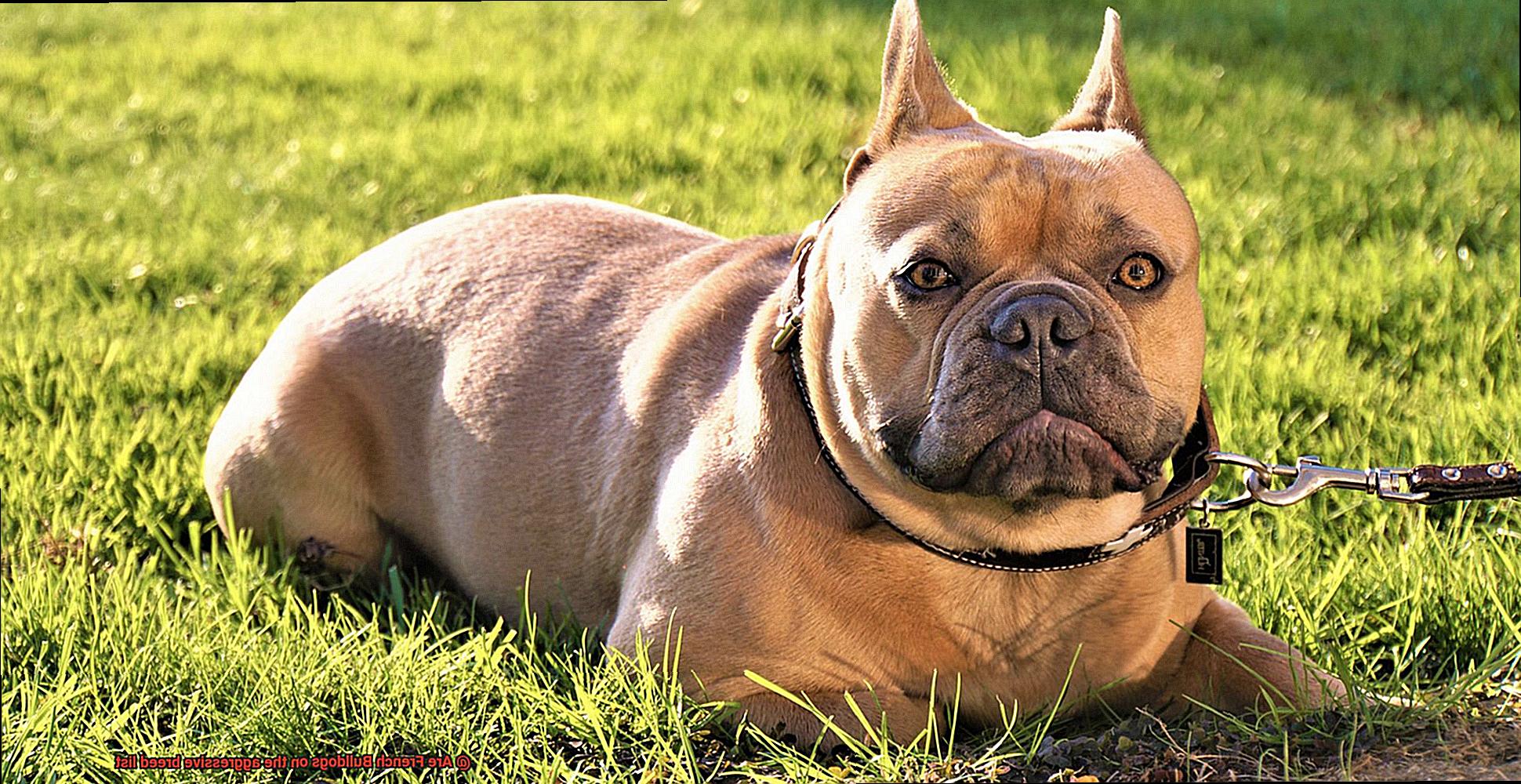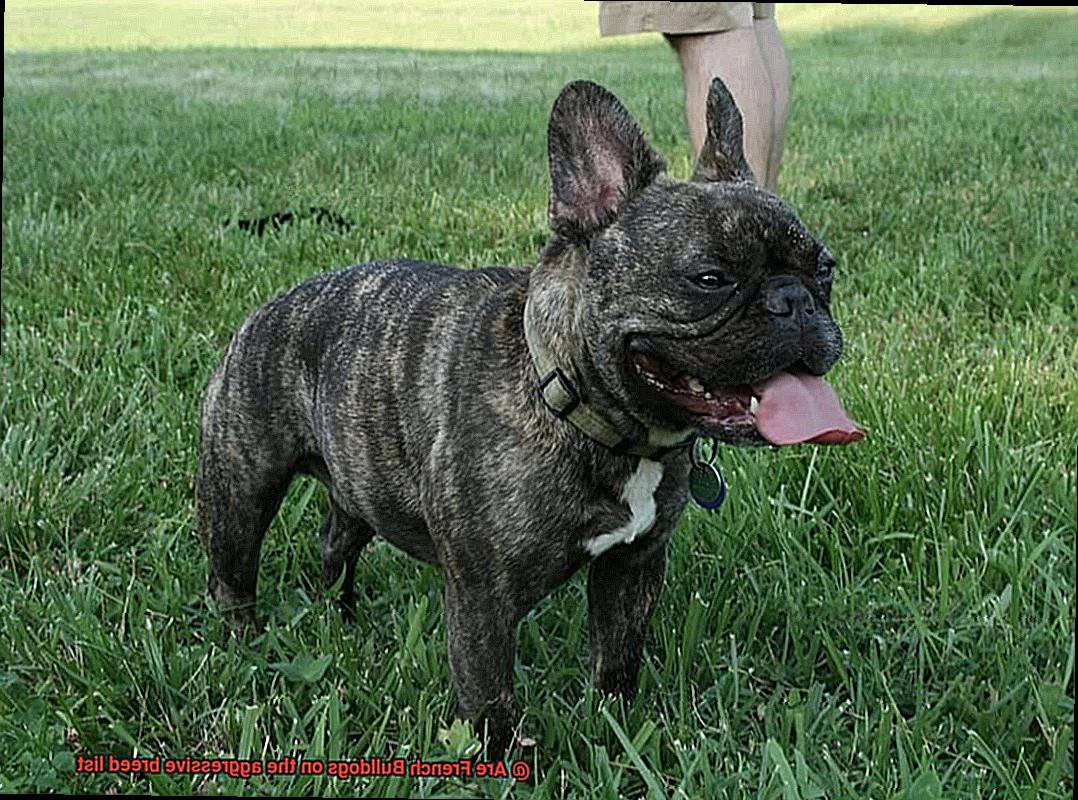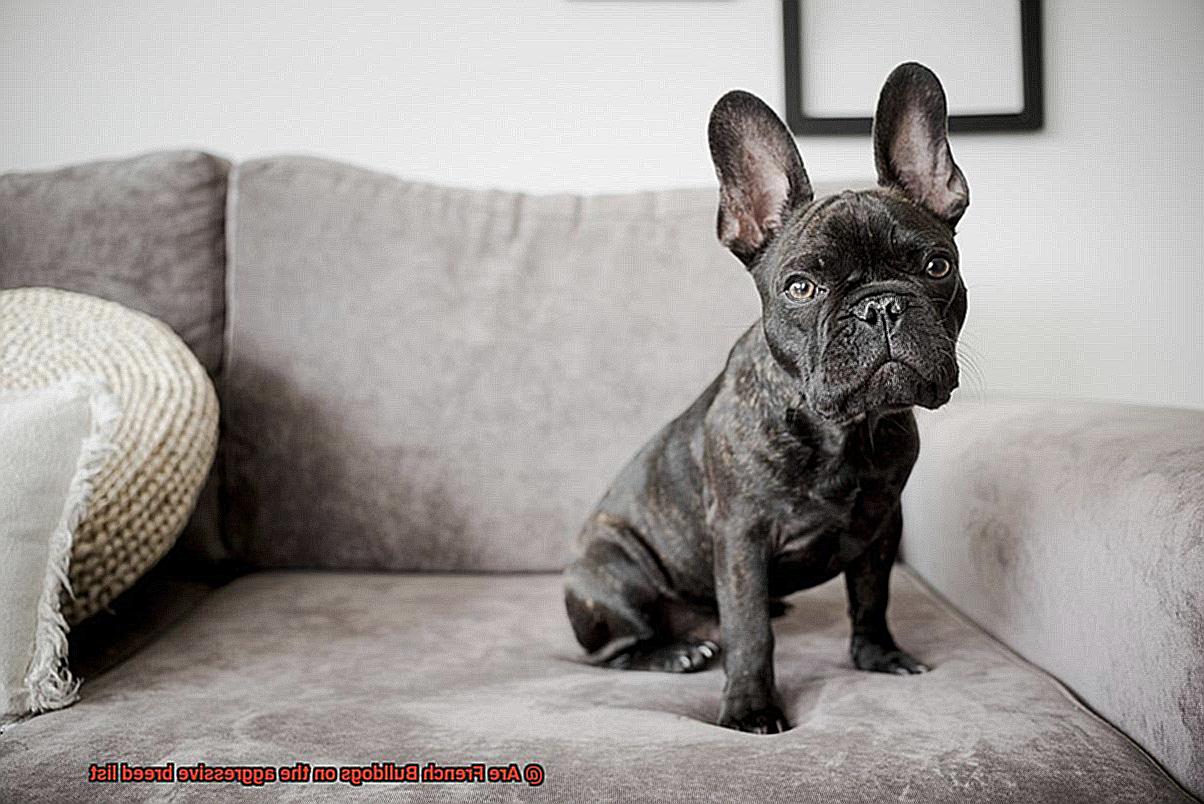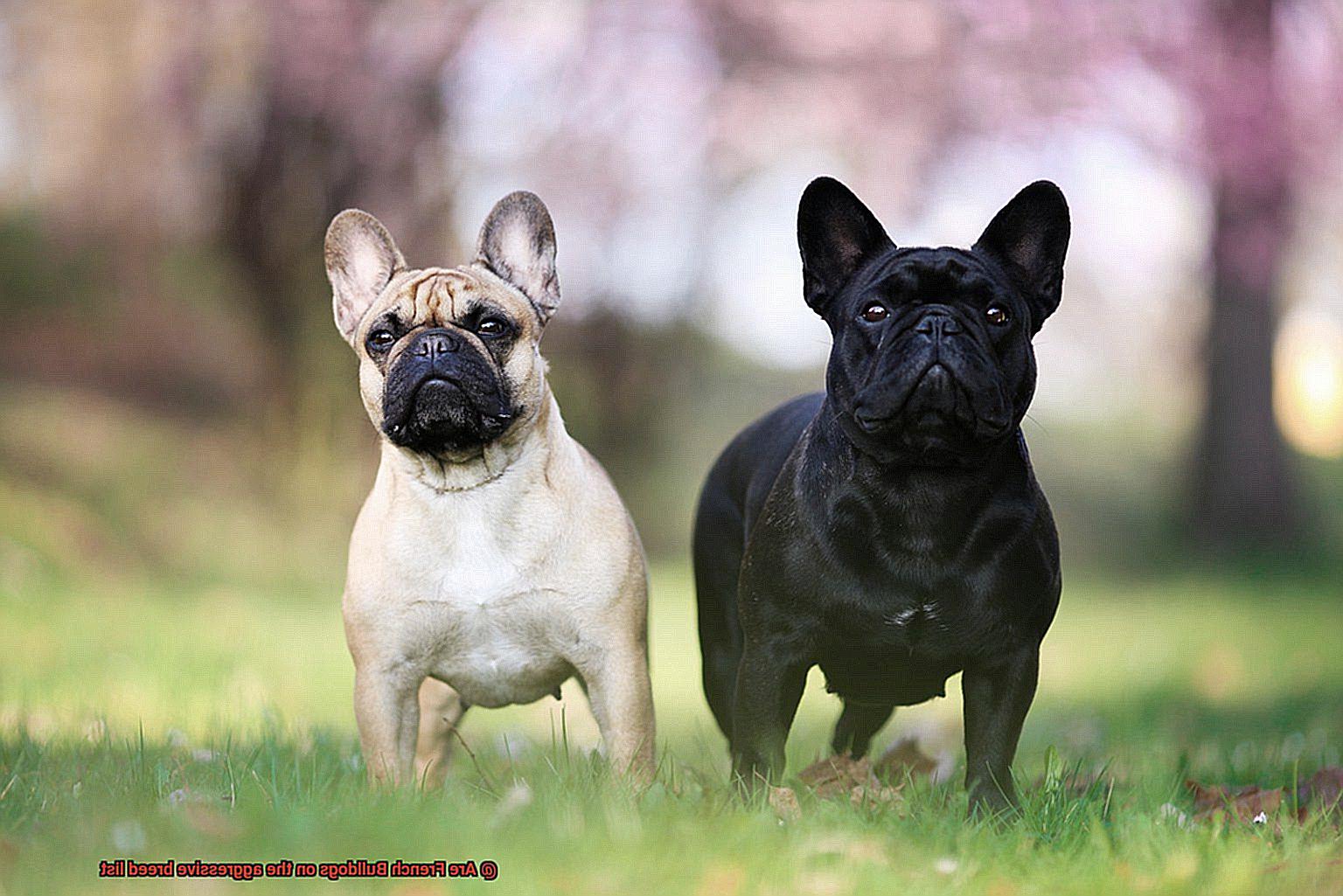Are French Bulldogs on the aggressive breed list?
French Bulldogs, those wrinkly-faced cuties that make your heart melt, have sparked some heated discussions about their temperament. Do they really belong on the aggressive breed list? Well, buckle up because in this blog post, we’re diving headfirst into this question.
We’ll explore what might cause aggression in French Bulldogs and how it affects their behavior. Plus, we’ll get insights from experts who know their stuff to shed light on this hot topic. So, if you’re itching to know more about the aggression tendencies of French Bulldogs, stick around and let’s uncover the truth together.
Exploring the Genetics of French Bulldogs
Contents
- 1 Exploring the Genetics of French Bulldogs
- 2 Socialization and Training for French Bulldogs
- 3 Potential Misconceptions About French Bulldog Aggression
- 3.1 Misconception 1: Aggressive Appearance Equals Aggressive Behavior
- 3.2 Misconception 2: Brachycephalic Breeds = Aggressive Dogs
- 3.3 Misconception 3: High Prey Drive Equals Aggression
- 3.4 Misconception 4: Protective Nature Mistaken for Aggression
- 3.5 Factors Contributing to Aggression:
- 3.6 Temperament and Training:
- 3.7 Addressing Aggression:
- 3.8 Conclusion:
- 4 Understanding Territorial and Possessive Behavior in French Bulldogs
- 5 The Role of Professional Help With Dog Aggression
- 6 The Impact of Breeding Practices on Temperament
- 7 Responsible Breeding Practices for French Bulldogs
- 8 Factors to Consider When Choosing a Reputable Breeder
- 9 Conclusion
French Bulldogs are beloved for their friendly and sociable nature, making them popular companions for families and individuals alike. However, like any breed, individual dogs can exhibit varying levels of aggression. In this blog post, we will explore the influence of genetics on aggression levels in French Bulldogs and provide insights into responsible breeding practices, socialization, and training to help ensure a well-behaved and friendly furry friend.
Understanding the Genetics:

French Bulldogs have a unique ancestry that involves crossing various bulldog breeds. This selective breeding aimed to create a smaller, companion-sized bulldog with distinct physical characteristics. One key genetic aspect of French Bulldogs is their brachycephalic (short-faced) structure, which can lead to certain health issues.
The Role of Genetics in Aggression:
Research has shown that genetics can play a role in determining a dog’s temperament, including aggression levels. However, it is important to note that aggression is a complex trait influenced by multiple factors. While there is no specific genetic marker or gene definitively linked to aggression in French Bulldogs, responsible breeding practices can help mitigate potential issues.
Responsible Breeding Practices:
Reputable breeders prioritize temperament and select breeding pairs based on overall health, behavior, and compatibility. This helps ensure that offspring are more likely to inherit desirable traits and have a stable temperament. When considering adding a French Bulldog to your family, it is crucial to thoroughly research and choose a responsible breeder.
Socialization and Training:
Proper socialization and training from an early age are vital for all dog breeds, including French Bulldogs. Exposing them to various people, animals, and environments helps develop positive behaviors and reduces the likelihood of aggression. Seek guidance from professional dog trainers or behaviorists if needed.
Socialization and Training for French Bulldogs
French Bulldogs are known for their friendly and sociable nature, but did you know that proper socialization and training can take their behavior to the next level? In this blog post, we’ll explore the importance of socialization and training for French Bulldogs, providing you with valuable insights and practical tips to ensure your furry friend grows up to be a well-mannered and balanced companion.
The Power of Socialization
- French Bulldogs thrive on social interactions, so early socialization is key.
- Expose your pup to different people, animals, sounds, environments, and situations.
- Puppy classes or obedience training can enhance socialization in a controlled environment.
- Choose a reputable trainer or training facility that uses positive reinforcement methods.
Training Basics

- Consistency is crucial for training success.
- Use positive reinforcement techniques like treats, praise, and rewards.
- Opt for short and fun training sessions to maintain your dog’s interest.
- Break down complex commands into smaller steps for easier learning.
Addressing Behavioral Issues
- French Bulldogs can sometimes display aggression. Consult a professional trainer or behaviorist if needed.
- Identify the underlying causes of aggression and develop a plan to manage and modify the behavior.
- Remember to approach behavioral issues with patience and understanding.


Going Beyond Obedience
- Consider advanced training options like agility or scent work for mental stimulation.
- Provide regular exercise to keep your French Bulldog physically and mentally fit.
- Engage in interactive playtime to strengthen the bond between you and your pup.
Potential Misconceptions About French Bulldog Aggression
French Bulldogs are often misunderstood when it comes to their temperament, with misconceptions surrounding their aggression. As an expert in French Bulldog behavior, I’m here to debunk these myths and provide you with a comprehensive guide to understanding your furry friend better. So, let’s dive right in.
Misconception 1: Aggressive Appearance Equals Aggressive Behavior

French Bulldogs may have a muscular build and a sturdy jaw, but aggression is not a breed-specific trait. Their adorable looks can be deceiving, as they are known for their affectionate and friendly nature.

Misconception 2: Brachycephalic Breeds = Aggressive Dogs
While it’s true that brachycephalic breeds like French Bulldogs may experience breathing difficulties, this does not contribute to aggression. Respiratory issues are separate from behavioral traits and should not be confused.
Misconception 3: High Prey Drive Equals Aggression
Not all French Bulldogs have a high prey drive, and it’s unfair to generalize this behavior to the entire breed. Proper socialization and training can help minimize any potential issues with prey drive and ensure harmonious interactions with small animals or children.
Misconception 4: Protective Nature Mistaken for Aggression
French Bulldogs, like many other breeds, can exhibit protective behaviors. However, this should not be mistaken for aggression. With proper training and socialization, your French Bulldog can become a well-rounded and friendly companion.
Factors Contributing to Aggression:
It’s important to understand that aggression in dogs is influenced by various factors such as genetics, early socialization experiences, training methods used, and individual temperament. It’s unfair to label an entire breed as aggressive based on the behavior of a few individuals.
Temperament and Training:
French Bulldogs are known for their affectionate and friendly nature, making them suitable for various living situations. They thrive in families with children and other pets when properly introduced. Remember, responsible ownership, training, and socialization are key in ensuring your French Bulldog remains a well-behaved companion.
Addressing Aggression:
If you notice any signs of aggression in your French Bulldog, it’s essential to take them seriously. Seek the guidance of a professional dog trainer or behaviorist who can provide specialized training and behavior modification techniques. Remember, addressing aggression requires patience and consistency.
Conclusion:
French Bulldogs are not inherently aggressive dogs. By dispelling the misconceptions surrounding their aggression and understanding the factors contributing to behavioral issues, you can ensure a happy and well-adjusted French Bulldog. Embrace positive training methods, prioritize socialization, and enjoy the affectionate companionship that French Bulldogs are known for.

Understanding Territorial and Possessive Behavior in French Bulldogs
Territorial and possessive behavior is a common trait in many dog breeds, including French Bulldogs. These behaviors can manifest in various ways, such as guarding their food, toys, or personal space.
It is essential for French Bulldog owners to understand and manage these behaviors to ensure a harmonious and safe living environment for both the dog and the family.

Instinctual Nature: The Root of Territorial and Possessive Behavior
French Bulldogs have a natural inclination to protect their resources, thanks to their ancestry as hunting and guarding dogs. This instinctual behavior can be observed in their tendency to mark their territory through urine scent marking or displaying aggression when someone encroaches on their perceived space.
Not All Bulldogs Are Created Equal
It’s important to note that not all French Bulldogs exhibit territorial or possessive behavior. Each dog’s personality and upbringing play a significant role in determining how they will behave in different situations. Some French Bulldogs may show minimal signs of possessiveness, while others may display more intense territorial behavior.
Recognizing the Signs
To effectively manage territorial and possessive behavior, it’s crucial to recognize the signs. Look out for growling, snapping, lunging, or biting when someone approaches their food bowl, toy, or resting area. Excessive barking or defensive body language like raised hackles and stiff posture are also indicators that your French Bulldog feels threatened or invaded.
Strategies for Effective Management
- Socialization: Expose your French Bulldog to various environments, people, and other animals from a young age. This exposure helps them develop confidence and reduces the likelihood of becoming overly protective or possessive.
- Positive Reinforcement Training: Use positive reinforcement techniques to reward your French Bulldog for calm and non-aggressive behavior. Reward-based training methods can help redirect their focus and reinforce desirable behaviors.
- Controlled Resource Access: Gradually teach your French Bulldog that you are in control of their resources, such as food and toys. Start by having them wait patiently before eating or playing with toys, gradually increasing the duration over time. This helps establish your dominance and reduces possessiveness.
- Supervised Interactions: Always supervise interactions between your French Bulldog and other animals or people, especially when it comes to sharing resources. This allows you to intervene if any possessive behavior arises and prevents potential conflicts or accidents.
- Seek Professional Help: If your French Bulldog’s territorial or possessive behavior becomes overwhelming or unmanageable, consider seeking assistance from a professional dog trainer or behaviorist. They can provide personalized guidance and techniques to address specific issues.
The Role of Professional Help With Dog Aggression
By seeking the expertise of a professional trainer or behaviorist, you can gain valuable insights and guidance on how to manage and modify your French Bulldog’s aggressive behavior.
Identifying the Root Causes:
Professional trainers have the knowledge and experience to identify the underlying factors contributing to your French Bulldog’s aggression. They will assess your dog’s behavior, body language, and environment to determine the triggers and root causes of the aggression.
Tailored Training Plan:
Working hand in hand with the dog owner, a professional will develop a customized training plan to address the aggression in your French Bulldog. This plan may include desensitization and counterconditioning techniques, obedience training, behavior modification exercises, and management strategies.
Education on Body Language:
Understanding your French Bulldog’s body language is crucial in preventing aggressive incidents from occurring. Professionals will educate you on how to read and interpret your dog’s signals, allowing you to intervene before aggression escalates.
Medication Management:
In some cases, medication may be recommended as part of the treatment plan for your French Bulldog’s aggression. A professional will collaborate with a veterinarian to determine if medication is necessary and monitor its effectiveness.
Owner Support and Guidance:

Professional help extends beyond training your French Bulldog; they also provide ongoing support and guidance throughout the process. They offer reassurance, answer questions, and ensure that you feel supported every step of the way.
The Impact of Breeding Practices on Temperament
French Bulldogs, with their adorable bat-like ears and playful personalities, have become one of the most popular dog breeds in recent years. But did you know that breeding practices can have a significant impact on their temperament? In this post, we’ll explore how breeding practices and socialization can shape the temperament of French Bulldogs.
Temperament refers to a dog’s inherent behavioral characteristics, including their friendliness, aggression, or shyness. Responsible breeders understand the importance of breeding for good temperament and strive to produce French Bulldogs with friendly and sociable personalities. They carefully select breeding pairs based not only on physical traits but also on temperament. This helps ensure that the puppies inherit desirable temperamental traits from their parents.
On the other hand, irresponsible breeding practices can result in French Bulldogs with aggressive tendencies. Breeding for appearance or profit without considering temperament can lead to dogs with unstable personalities. Inbreeding and line breeding, which involve mating closely related dogs, can increase the risk of genetic disorders and behavioral issues, including aggression.
Puppy mills and backyard breeders are notorious for prioritizing quantity over quality. They often neglect proper socialization and temperament testing of their puppies. Lack of socialization during the critical period of a French Bulldog’s development can lead to fearfulness, anxiety, and aggression later in life.
That’s why it’s crucial for potential French Bulldog owners to do their research and choose reputable breeders who prioritize temperament. Reputable breeders take steps to ensure that their puppies are well-socialized before going to their new homes. They expose the puppies to various environments, people, and other animals, helping them develop into confident and well-adjusted adults.
But breeding practices alone are not enough to shape a French Bulldog’s temperament. Early socialization, positive reinforcement training, and providing a nurturing environment are also essential. Early socialization involves exposing the puppies to different stimuli in a positive and controlled manner, such as meeting new people, interacting with other animals, and experiencing different sounds and environments. This helps them learn how to cope with new experiences and prevents fear-based aggression.
Positive reinforcement training focuses on rewarding desired behaviors rather than punishing undesirable ones. It helps build a strong bond between the owner and the dog while teaching them appropriate ways to interact with their environment. French Bulldogs respond well to positive reinforcement training methods, as they are eager to please their owners.
Providing a nurturing environment is also crucial for shaping a French Bulldog’s temperament. They thrive on love, attention, and consistent routines. Creating a safe and stable home environment helps reduce anxiety and promotes a well-balanced temperament.
Responsible Breeding Practices for French Bulldogs
It is essential to prioritize responsible breeding practices to maintain the temperament and health of these adorable dogs. Here are some top tips for responsible breeding practices for French Bulldogs:
- Choose Healthy and Well-Tempered Parents: Selecting parents with good health and a friendly temperament is crucial. Conduct health screenings to identify any genetic conditions that may be prevalent in the breed, such as hip dysplasia or breathing difficulties. By breeding only healthy dogs, you can help reduce the risk of passing on these conditions to the puppies.
- Focus on Proper Socialization: Early socialization is key to shaping a French Bulldog’s behavior. Expose the puppies to various environments, people, and other animals from an early age. This helps them become well-adjusted adults and reduces the likelihood of behavioral issues later in life.
- Provide Adequate Care and Nutrition: Ensure that both the parents and puppies receive proper care and nutrition. This includes providing a balanced diet, regular veterinary check-ups, vaccinations, and appropriate exercise. Good nutrition is essential for their overall health and well-being.
- Find Suitable Homes: Responsible breeders prioritize finding suitable homes for their puppies. Screen potential owners carefully to ensure they understand the breed’s specific needs and can provide a loving and nurturing environment. Offering ongoing support to new owners can also help ensure the well-being of the dog throughout its life.
- Educate Potential Owners: Educate potential owners about the breed’s characteristics, temperament, and specific needs. Help them understand what it takes to care for a French Bulldog properly, including training, healthcare, exercise requirements, and potential breed-specific challenges.
Factors to Consider When Choosing a Reputable Breeder
These adorable dogs with their unique personalities and charming looks make fantastic companions. However, finding a reputable breeder is crucial to ensure that you bring home a healthy and well-adjusted puppy. In this article, we will discuss the seven factors you need to consider when choosing a reputable breeder for your French Bulldog.
Health Testing:
A reputable breeder should prioritize the health of their breeding dogs. They should conduct health tests, such as hip dysplasia, eye disease, and cardiac evaluations, to ensure that they are not passing on any genetic health issues to their puppies. Ask the breeder about the specific tests they perform and request documentation to verify the results.
Breeding Practices:
A responsible breeder will have a clear breeding program in place. They will not breed their dogs too frequently or without careful consideration. They should have an in-depth understanding of the breed standard and strive to produce puppies that meet these standards both in appearance and temperament.
Socialization:
Puppies that receive early socialization are more likely to grow up into well-adjusted and friendly dogs. A reputable breeder will expose their puppies to various stimuli from an early age, including different people, animals, and environments. This helps puppies develop confidence and adaptability.
Knowledge and Experience:
Choose a breeder who demonstrates extensive knowledge and experience with French Bulldogs. They should be able to answer your questions about the breed’s characteristics, care requirements, training needs, and potential health issues. A knowledgeable breeder will also provide ongoing guidance and support as you navigate life with your new furry friend.
References and Reviews:
Ask the breeder for references or read reviews from previous puppy buyers. Hearing about others’ experiences can give you valuable insights into the breeder’s reputation and the quality of puppies they produce. A reputable breeder will have happy customers who are willing to attest to their ethical practices.
Contract and Guarantees:
A reputable breeder will provide you with a written contract that outlines the terms and conditions of the sale. This contract may include health guarantees, return policies, and any agreements made between the breeder and the buyer. Carefully review the contract before making a commitment to ensure you understand all expectations.
Responsible Breeding Practices:
Choose a breeder who genuinely loves the breed and prioritizes the well-being of their dogs over profit. A responsible breeder will not engage in unethical practices, such as breeding dogs with known health issues or breeding without considering temperament or breed standards. They should focus on improving the breed and producing healthy, happy puppies.
U9FfZtV10_Y” >
Conclusion
In conclusion, it is important to note that French Bulldogs are not typically on the aggressive breed list.
These adorable canines are known for their friendly and affectionate nature, making them popular family pets. While every dog is an individual and behavior can vary, French Bulldogs generally have a calm demeanor and get along well with children and other animals.
It is crucial to remember that proper training, socialization, and responsible ownership play a significant role in shaping a dog’s behavior.




